
The risk is that if you mess up, you do so very publicly. G4S, a British-based security firm, was hoping that handling security for the games (which it, too, sponsors, though not at the top level) would gild its reputation. "If we can do it for the Olympics, we can do it for you," said Ian Horseman-Sewell, G4S's director of events, on June 21st. Shortly afterwards, the firm discovered that it couldn't do it for the Olympics, having failed to train anything like enough staff. G4S's share price did a passable imitation of an Olympic diver (see article).
赞助奥运的风险在于:如果你办砸了,你就会在广大公众面前出洋相。总部位于英国的保安公司 G4S 曾希望为奥运会处理安保工作能为其增光添彩(它也对奥运进行了赞助,尽管并未跻身顶级赞助商行列)。G4S 的项目主管 Ian Horseman-Sewell 在6月21日称:"如果我们能为奥运会做安保,我们也能为你做"。不久之后,该公司发现它培训的职员不够,无法为奥运提供安保。其后 G4S 的股价大幅跳水(见另文)。
Most top-level sponsors, such as McDonald's, Omega, Panasonic and Procter & Gamble, are not trying to prove their prowess. They are just trying to look noble and global by association in a way that wows and woos customers. How they do so reveals the brilliance of the IOC's stand against the "crass commercialism" of corporate ads and logos at the games. Unable to advertise inside, the sponsors must advertise outside, by way of posters and packaging and every other platform at their disposal. And to reap the benefit of their sponsorship, this advertising must be linked back to the Olympics: so every billboard and chocolate bar and television set carries the Olympic logo. It is hard to walk down a high street anywhere in the world without being reminded of the Olympics.In effect, the sponsors are paying to provide publicity for the Olympics. This is a fantastic deal for the IOC. Is it also good for the sponsors? "I don't know," admits the boss of one big sponsor.
如麦当劳、欧米茄、松下和宝洁等大多数顶级赞助商并未试图去证明它们的高超商业技巧。它们只是试图以让顾客交口称赞的方式来建立起贵族化和全球性的形象。它们的经营方式表明,国际奥委会在处理奥运会中的公司广告和商标时采取了光辉立场,反对"唯利是图"。由于无法在场内做广告,赞助商只有通过海报、包装以及其它可用的各种平台从场外着手。而为了收回赞助的利益,这种广告必须重新链接到奥运上来:于是每个广告牌、每块巧克力、每台电视机都打上了奥运商标。走过每一条大街,几乎都能让人联想到奥运。实际上,赞助商花钱为奥运做了宣传。这笔交易让国际奥委会大赚。赞助商也从中获利了么?一家大赞助商的老板坦承:"我不清楚。"
A study by Jonathan Jensen of Columbia College, Chicago and Anne Hsu of Relay Worldwide, a sports-marketing firm, has found that in general companies that sponsor generously tend to do well. They looked at the 51 American firms that spent more than $15m annually on sponsorship (mostly of sports) between 2005 and 2009. Net income at these firms grew faster than at S&P 500 firms in general (7.8% to 6.5% per year). The biggest sponsors did even better: the top 16, which spent on average $160m a year on sponsorship, saw net income grow by 22.1% annually.
芝加哥哥伦比亚大学(Columia College)的 Jonathan Jensen 和运动营销公司 Relay Worldwide 的 Anne Hsu 所做的研究发现,总体来说,进行慷慨赞助的公司往往业绩不错。他们调查了51家在2005到2009年间平均每年进行1500万美元以上赞助(多数用于运动行业)的美国公司。总体来说,这些公司的净收入增长比标准普尔500家上市公司要快(前者为每年7.8%,后者为每年6.5%)。部分最大的赞助商业绩更佳:每年赞助额在1.6亿美元以上的前16家公司的净收入年均增长了22.1%。
The authors do not claim that sponsorship makes businesses more profitable. Rather, big sponsors tend to be firms with brands that are already well-known. Lesser-known firms buy ads to explain to customers who they are. The likes of Coke and IBM back athletes to make consumers feel warmer about their brands. There is evidence that such backing can work, at least on a team-by-team level. Jorg Henseler of Radboud University has found that in the Netherlands sponsoring football teams makes brands more valuable. And even if there is no such direct effect from sponsoring the games, there is an indirect benefit: you raise ever further the costs of entering the global market. It is spending like this that makes competing with Coke hard, even when making fizzy drinks is easy.
笔者并非是指赞助让企业盈利更多。相反,大赞助商往往都是已经拥有著名品牌的公司。知名度较低的公司通过做广告来向顾客推销自己。像可口可乐和 IBM 这种类型的公司通过赞助运动员来让顾客更热衷于自己的品牌。有证据表明这种支持确有成效,至少在赞助运动团队时是这样。拉德伯德大学(Radboud University)的 Jorg Henseler 发现,在荷兰,赞助足球队会让品牌升值。即使赞助奥运会没有此类直接效益,也会有一种间接效益:你抬高了进入全球市场的成本门槛。虽然现在制造碳酸饮料并不困难,但这种赞助开支让别的公司很难同可口可乐竞争。













